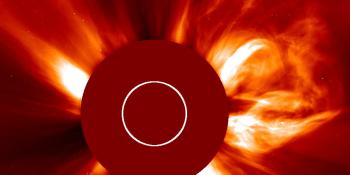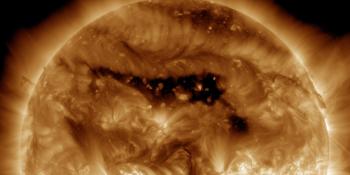Viewing archive of Wednesday, 11 August 2004
Solar activity report
Any mentioned solar flare in this report has a scaling factor applied by the Space Weather Prediction Center (SWPC). Because of the SWPC scaling factor, solar flares are reported as 42% smaller than for the science quality data. The scaling factor has been removed from our archived solar flare data to reflect the true physical units.
Report of Solar-Geophysical Activity 2004 Aug 11 2200 UTCPrepared by the NOAA © SWPC and processed by SpaceWeatherLive.com
Joint USAF/NOAA Report of Solar and Geophysical Activity
SDF Number 224 Issued at 2200Z on 11 Aug 2004IA. Analysis of Solar Active Regions and Activity from 10-2100Z to 11-2100Z Solar activity was low. Today's activity consisted of
numerous C-class flares, predominantly from Region 656 (S13E03). The
largest event of the day was a C7/Sf from 656 at 1141 UTC. Region
656 continues to grow and is nearly 1000 millionths in area. The
group continues to have a magnetic delta classification. A slow,
faint CME was seen in LASCO off the south limb yesterday, beginning
at about 10/1854 UTC in C2 imagery. The CME was associated with
surge activity and a subsequent EIT wave that was observed just
north of 656 and east of central meridian.
IB. Solar Activity Forecast
Solar activity is expected to be low
to moderate. C-flares should continue and there is a good chance for
an isolated M-class event during the next three days. There is also
a slight chance for a major flare event from 656. Background levels
are expected to increase tomorrow with the return of old Region 652
(N07, Carrington = 347).
IIA. Geophysical Activity Summary 10-2100Z to 11-2100Z
The geomagnetic field ranged from quiet to active levels. Solar wind
data show the continuing influence of a high-speed coronal hole wind
stream. The greater than 2 MeV electron fluxes reached high levels
during the past 24 hours.
IIB. Geophysical Activity Forecast
The geomagnetic field is
expected to be generally unsettled with a chance for isolated active
periods for the next two days (12-13 August). Conditions are
expected to be unsettled to active on the 3rd day (14 August) with
the arrival of weak transient flow from yesterday's CME.
III. Event Probabilities 12 Aug to 14 Aug
| Class M | 55% | 55% | 55% |
| Class X | 10% | 10% | 10% |
| Proton | 10% | 10% | 10% |
| PCAF | green | ||
IV. Penticton 10.7 cm Flux
Observed 11 Aug 131 Predicted 12 Aug-14 Aug 140/145/150 90 Day Mean 11 Aug 107
V. Geomagnetic A Indices
Observed Afr/Ap 10 Aug 012/014 Estimated Afr/Ap 11 Aug 012/013 Predicted Afr/Ap 12 Aug-14 Aug 010/010-010/010-015/012
VI. Geomagnetic Activity Probabilities 12 Aug to 14 Aug
| A. Middle Latitudes | |||
|---|---|---|---|
| Active | 30% | 30% | 35% |
| Minor storm | 15% | 15% | 20% |
| Major-severe storm | 05% | 05% | 05% |
| B. High Latitudes | |||
|---|---|---|---|
| Active | 35% | 35% | 40% |
| Minor storm | 15% | 15% | 20% |
| Major-severe storm | 05% | 05% | 05% |
All times in UTC
Latest news
Latest forum messages
AR 13932 20Incoming & Unnumbered Active Regions 1361AR 3928 6Strong far side CME 338Unspecified geomagnetic activity 1751
More topicsSupport SpaceWeatherLive.com!
A lot of people come to SpaceWeatherLive to follow the Sun's activity or if there is aurora to be seen, but with more traffic comes higher server costs. Consider a donation if you enjoy SpaceWeatherLive so we can keep the website online!

Space weather facts
| Last X-flare | 2024/12/08 | X2.2 |
| Last M-flare | 2024/12/23 | M8.9 |
| Last geomagnetic storm | 2024/12/17 | Kp5+ (G1) |
| Spotless days | |
|---|---|
| Last spotless day | 2022/06/08 |
| Monthly mean Sunspot Number | |
|---|---|
| November 2024 | 152.5 -13.9 |
| December 2024 | 106.6 -45.9 |
| Last 30 days | 116.1 -41.8 |


